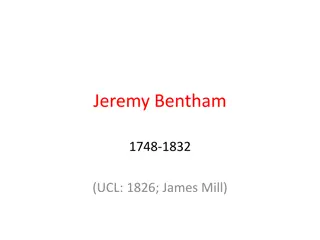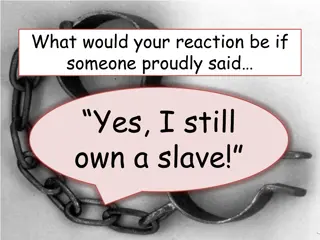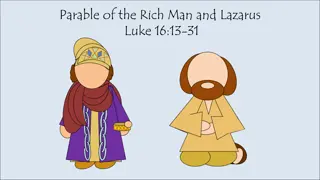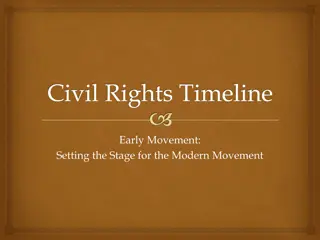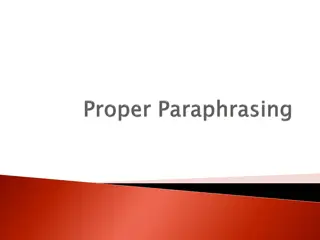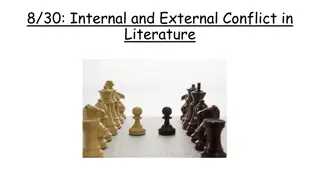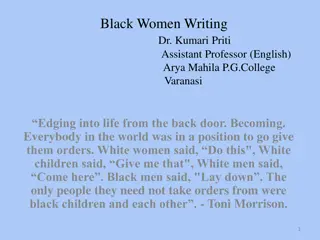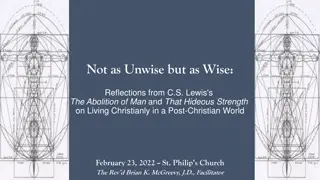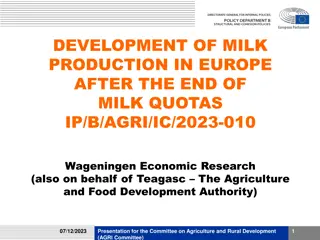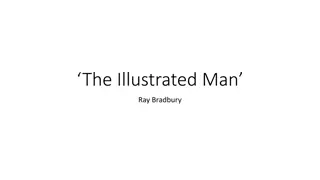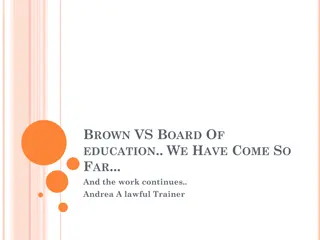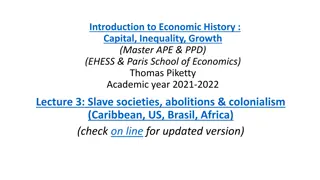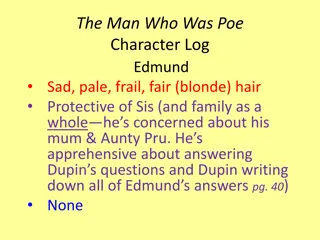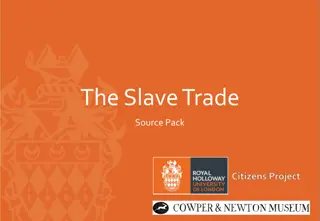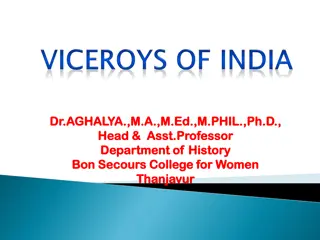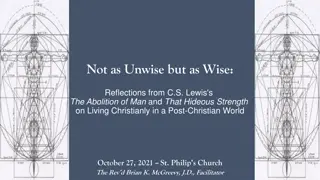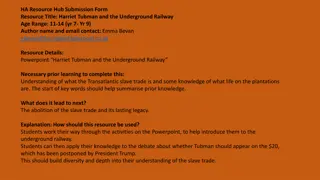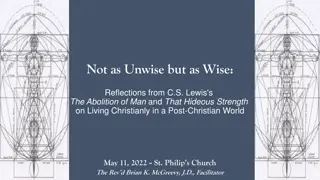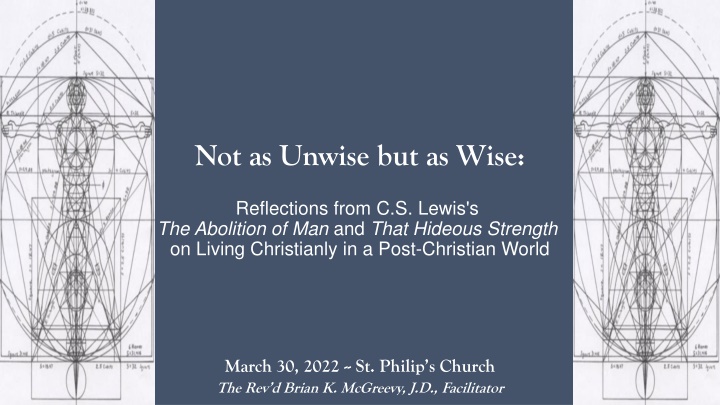
Reflections from C.S. Lewis: Living Christianly in a Post-Christian World
Explore insights from C.S. Lewis's "The Abolition of Man" and "That Hideous Strength" on navigating a post-Christian society with wisdom and faith. Join this enriching study session led by The Rev. Brian K. McGreevy, J.D.
Download Presentation

Please find below an Image/Link to download the presentation.
The content on the website is provided AS IS for your information and personal use only. It may not be sold, licensed, or shared on other websites without obtaining consent from the author. If you encounter any issues during the download, it is possible that the publisher has removed the file from their server.
You are allowed to download the files provided on this website for personal or commercial use, subject to the condition that they are used lawfully. All files are the property of their respective owners.
The content on the website is provided AS IS for your information and personal use only. It may not be sold, licensed, or shared on other websites without obtaining consent from the author.
E N D
Presentation Transcript
Not as Unwise but as Wise: Reflections from C.S. Lewis's The Abolition of Man and That Hideous Strength on Living Christianly in a Post-Christian World March 30, 2022 -- St. Philip s Church The Rev d Brian K. McGreevy, J.D., Facilitator
For at one time you were darkness, but now you are light in the Lord. Walk as children of light (for the fruit of light is found in all that is good and right and true), and try to discern what is pleasing to the Lord. Take no part in the unfruitful works of darkness, but instead expose them. For it is shameful even to speak of the things that they do in secret. But when anything is exposed by the light, it becomes visible, for anything that becomes visible is light. Therefore it says, Awake, O sleeper, and arise from the dead, and Christ will shine on you. Look carefully then how you walk, not as unwise but as wise, making the best use of the time, because the days are evil. Therefore do not be foolish, but understand what the will of the Lord is. Ephesians 5: 8-17
How to approach this class: --On the beach --Snorkeling --Scuba diving --Email list How to read That Hideous Strength: --One chapter at a time --Make a chart of characters --Look for and note where themes from The Abolition of Man appear What we ll be doing each week: --Examining context and establishing a framework for appreciating these books --Unpacking the meaning of Lewis s works --Exploring their relevance for today --Considering how we can respond with practices of Hope and of Wisdom rooted in the Scriptures
REVIEW FROM PREVIOUS CLASSES Summary: Main theme of each chapter in The Abolition of Man 1. Men without Chests : The importance of objective values and the poison of subjectivism 2. The Way : Why the Tao, or Natural Law, is the sole source of all value judgments 3. The Abolition of Man : Man s control of Nature is in reality a means for some men (Conditioners) to control other men, using Nature as their instrument. To see through (deconstruct) all things is not to see at all. PLOT SUMMARY OF THE RANSOM TRILOGY Adapted from Taylor Dinerman, The Space Review -- Out of the Silent Planet, tells how Ransom, a Cambridge don on holiday, is kidnapped by the physicist Weston and his partner Devine, a sleazy businessman, and taken to Malacandra (Mars), supposedly as a human sacrifice. -- Perelandra, the name Lewis gives to Venus, is also the title of the second book in the series. Retelling the story of Adam and Eve, it is the most explicitly biblical of the three. Weston plays the role of the serpent sent to tempt the woman who is to become the mother of the world into rejecting God s will. Ransom is sent by the Oyarsa to challenge the evil one and to save Venus from the fate of Earth. -- That Hideous Strength combines a sordid tale of intra-university politics, Arthurian legend, and spiritual combat. In a small British University town, one of the colleges finds itself seduced and then engulfed by the newly established National Institute for Coordinated Experiments (N.I.C.E). This organization is secretly controlled by a pair of initiates, who plan to revive the wizard Merlin from his long, enchanted slumber and to use his powers for their own purposes. TITLE SOURCE The shadow of that hyddeous strength, sax myle and more it is of length (Sir David Lyndsay: from Ane Dialog, describing the Tower of Babel) This is a tall story about devilry, though it has behind it a serious point which I have tried to make in my Abolition of Man. from Preface to That Hideous Strength
REVIEW OF CHAPTER 1, SALE OF COLLEGE PROPERTY --Jane and her dreams --Mark and the Inner Circle at Bracton College --The proposal to sell Bragdon Wood and Merlin s Well to the N.I.C.E. --The Dimbles and rumors of Merlin REVIEW OF CHAPTER 2, DINNER WITH THE SUBWARDEN --Mark and being included in Feverstone s confidence in disdain of Curry and Busby --The N.I.C.E. as the ultimate Inner Circle/Ring , focused on taking over and reconditioning the human race, controlling and subduing Nature, and exerting control over the interplanetary wars --Jane s fears and vulnerability, which she later rejects as unworthy --Mark s journey to Belbury and Jane s journey to St. Anne s-on-the-Hill REVIEW OF CHAPTER 3, BELBURY AND ST. ANNE S-ON-THE-HILL --doublespeak at the N.I.C.E.: does Mark have a job or not? Bill Hingest leaving the N.I.C.E. --Jane s visit to St. Anne s and her denial and her aversion to being interfered with --Mark s introduction to Fairy Hardcastle and the role of the N.I.C.E. secret police --Jane s resentment of how much she has had to give up in marriage; Mother Dimble s crisis REVIEW OF CHAPTER 4, THE LIQUIDATION OF ANACHRONISMS --the N.I.C.E. begin turning people out of their homes and destroying Edgestow s beauty --Bill Hingest is murdered the night he leaves the N.I.C.E. --Mark has a strange conversation with the N.I.C.E. mad parson and is assigned a propaganda project on destroying the village of Cure Hardy, only to find he is moved by its beauty --the invasive force of workers from the N.I.C.E. results in partially destroying the beautiful Fellows Room at Bracton
REVIEW OF CHAPTER 5, ELASTICITY --Mark, frustrated by the doublespeak and lack of clarity at the N.I.C.E., attempts a showdown with Wither, the Deputy Director, that does not go well at all, and Mark fears he may not only lose his position at the N.I.C.E. but also his fellowship at Bracton College. --Fairy Hardcastle warns Mark about complaining and offers him project work writing propaganda to rehabilitate the image of Alcasan, the criminal murderer. It becomes clear that the N.I.C.E. intends to operate through threats and coercion. --Meanwhile, Jane spends time with Camilla and Arthur Denniston, learning that they now live at St. Anne's, a community run by Mr. Fisher-King, a renowned man incapacitated by a wounded heel. The Dennistons urge Jane to join their company and use her gift of visions to help them for the good of all, but she refuses, wishing to guard her independence. REVIEW OF CHAPTER 6, FOG --As fog envelops Edgestow and the N.I.C.E., Mark in desperation accepts a job at the N.I.C.E. working on propaganda. --Mark is admitted to the Inner Circle at the N.I.C.E., learning he can get whatever money he wants from the N.I.C.E. steward. He begins work on propaganda supporting the riots being instigated by the N.I.C.E., suppressing his initial shock and moral repugnance, to assist the N.I.C.E. in getting emergency powers to suppress liberties. --In the village, Jane sees the man with pince-nez glasses and a pointed beard whom she recognizes from her latest dream. When he gets into a N.I.C.E. car, she immediately decides to go to St. Anne's-on-the-Hill, feeling "a total rejection, or revulsion from, this man on all levels of her being at once. REVIEW OF CHAPTER 7, THE PENDRAGON --After fleeing the man in the pince nez from the N.I.C.E., Jane arrives at St. Anne s and is taken to see the Director. --Upon entering the Director s room, Jane s entire world was unmade, as she is swept away by the Beauty and Holiness and Kingliness of the Director and the house. --Trying to return home afterwards, Jane is caught up in a riot, arrested by the N.I.C.E. police, tortured by Fairy Hardcastle, and then escapes back to the Manor at St. Anne s.
REVIEW OF CHAPTER 8, MOONLIGHT AT BELBURY --Wither expresses his displeasure to Fairy Hardcastle about her arrest and torture of Jane Studdock and failure to prevent her escape. --Mark is in good spirits as everyone talks about how well the riots went and smugly enjoys that most don t know the articles written about it were his propaganda project. --Wither flatters Mark and encourages him to invite Jane out to join them, but Mark refuses, displeasing Wither. --Mark converses with Filostrato, who advocates getting rid of all organic life on earth and then tells Mark that the Head has survived death, and his brain lives on. He reveals the Head is Francois Alcasan, and then takes Mark to a lab-type room to meet the Head. REVIEW OF CHAPTER 9, THE SARACEN S HEAD --Jane is horrified to see the bodiless Head of the N.I.C.E. in her dream and to see her husband Mark bow down to it. --The Director assures Jane they will try to rescue Mark. --Mark resolves he must bring Jane to Belbury if he is to save his life. --Fairy Hardcastle seeks to get Mark to sign a form allowing for Jane s arrest, arguing that she might be sent to an Asylum for accusing the Fairy of burning her with cigarettes. --At St. Anne s, Jane learns the story of Ransom, the Director, and his interplanetary travels and dealings with the eldils, as well as his identity as the Pendragon of Logres. --The Director holds Council with those at St. Anne s, stating that that Jane's dreams reveal that the N.I.C.E. have discovered a way of making themselves immortal, but that the Company must wait on the eldils to reveal their plan before taking any action.
REVIEW OF CHAPTER 10, THE CONQUERED CITY --Wither and Fairy Hardcastle produce Mark s long-lost wallet, saying it was found at the scene of Bill Hingest s murder, and seek to use this information to control and manipulate Mark. --Mark has a showdown with Dr. Dimble about where Jane is, and Dimble makes clear that he considers Mark and the N.I.C.E. as evil and a danger to Jane. He offers Mark the chance to leave the N.I.C.E., but Mark dithers and ends up being arrested for murder. --Jane s latest vision indicates that Merlin has awakened and that the site is nearby, so after prayer Jane, Denniston, and Dr. Dimble are dispatched to search for him. SUMMARY OF CHAPTER 11 Adapted from Rudy Rentzel Jane, Dimble, and Denniston try looking for the place Jane saw in her dream about Merlin. As they go tramping about the countryside, they start to feel like they experience Ancient Britain, which is both exciting and terrifying. Jane began to think about the childhood religion she had left long ago, and wonders whether there might be a deeper, truer religion that might enable her to better face this situation. They think they see a man, but are not sure if he is simply a tramp in modern clothes. Meanwhile, Fairy Hardcastle tries to convince Wither to let her torture Mark so he will disclose Jane's location. Wither resists, saying the worst thing in this situation would be to use torture, reasoning that even if they obtained Jane's location and brought her to Belbury, her shock at discovering Mark had been tortured might be enough to dislodge her gift, which would render her useless to them. Professor Frost concurs. Sending Fairy away, Frost then reminds Wither that the authorities warn that if Jane falls into the wrong hands, she could pose a grave danger to their plans. Since Jane's mind is now opaque to the authorities, they believe she has fallen into enemy hands. Therefore, Wither and Frost agree that they must somehow induce Mark to bring his wife to Belbury, and the best means of achieving this may be to invite Mark into a deeper unity with their deepest inner circle, which they demonstrate in a voracious embrace.
In this same conversation, Frost reveals that though Filostrato really believes they are keeping the Head alive, he is mistaken. He also indicates that the N.I.C.E. are interested in Mark and Jane for eugenics purposes. Meanwhile, Mark is in a prison cell, faced with the probalility of being hanged for murder. He suspects he is in the custody of the N.I.C.E. and begins to understand he was a fool for every having trusted them. He also begins to clearly see his folly at his lust for always seeking inclusion in the most inner circle he could find, no matter the cost. As he looks back upon his life with "disgust at its dreariness, his thoughts turned to Jane. Appreciating anew the depth of her good qualities, he imagines that his death might be good for Jane so she would be free to marry someone worthy of her. When Professor Frost enters his cell, Mark knows he is held by the N.I.C.E. and is terrified by the Evil emanatiNg from Frost. KEY PASSAGES FROM CHAPTER 11 The change from the road to the field was as if one had passed from a waking into a phantasmal world. Everything became darker, wetter, more incalculable. Each small descent felt as if you might be coming to the edge of a precipice They were following a track beside a hedge; wet and prickly tentacles seemed to snatch at them as they went When the light vanished the cold, noisy darkness seemed a huge thing. The fear which Dimble had felt from the first began to trickle into the minds of the others as they proceeded like water coming into a ship from a slow leak. They realised that they had not really believed in Merlin till now. They had thought they were believing the Director in the kitchen; but they had been mistaken. The shock was still to take. Out here with only the changing red light ahead and the black all round, one really began to accept as fact this tryst with something dead and yet not dead, something dug up, exhumed, from that dark pit of history which lies between the ancient Romans and the beginning of the English. The Dark Ages, thought Dimble; how lightly one had read and written those words. But now they were going to step right into that Darkness. It was an age, not a man, that awaited them in the horrible little dingle. And suddenly all that Britain which had been so long familiar to him as a scholar rose up like a solid thing. He could see it all. Little dwindling cities where the light of Rome still rested little Christian sites, Camalodunum, Kaerleon, Glastonbury a church, a villa or two, a huddle of
houses, an earthwork. And then, beginning scarcely a stones throw beyond the gates, the wet, tangled endless woods, silted with the accumulated decay of autumns that had been dropping leaves since before Britain was an island; wolves slinking, beavers building, wide shallow marshes, dim horns and drummings, eyes in the thickets, eyes of men not only Pre-Roman but Pre-British, ancient creatures, unhappy and dispossessed, who became the elves and ogres and wood- wooses of the later tradition. But worse than the forests, the clearings. Little strongholds with unheard-of kings. Little colleges and covines of Druids. Houses whose mortar had been ritually mixed with babies blood. They had tried to do that to Merlin. And now all that age, horribly dislocated, wrenched out of its place in the time series and forced to come back and go through all its motions yet again with doubled monstrosity, was flowing towards them and would, in a few minutes, receive them into itself. unseen Realities Hitherto Jane had scarcely attempted to think of what might lie before them. As they went on, the real meaning of that scene in the kitchen began to dawn on her. He had sent the men to bid goodbye to their wives. He had blessed them all. It was likely, then, that this this stumbling walk on a wet night across a ploughed field meant death. Death the thing one had always heard of (like love), the thing the poets had written about. So this was how it was going to be. But that was not the main point. Jane was trying to see death in the new light of all she had heard since she left Edgestow. She had long ceased to feel any resentment at the Director s tendency, as it were, to dispose of her to give her, at one time or in one sense, to Mark, and in another to Maleldil never, in any sense, to keep her for himself. She accepted that. And of Mark she did not think much, because to think of him increasingly aroused feelings of pity and guilt. But Maleldil. Up till now she had not thought of Maleldil either. She did not doubt that the eldils existed; nor did she doubt the existence of this stronger and more obscure being whom they obeyed whom the Director obeyed, and through him the whole household, even MacPhee. If it had ever occurred to her to question whether all these things might be the reality behind what she had been taught at school as religion, she had put the thought aside. The distance between these alarming and operative realities and the memory, say, of fat Mrs. Dimble saying her prayers, was too wide. The things belonged, for her, to different worlds. On the one hand, terror of dreams, rapture of obedience, the tingling light and sound from under the Director s door, and the great struggle against an imminent danger; on the other, the smell of pews, horrible lithographs of
the Saviour (apparently seven feet high, with the face of a consumptive girl), the embarrassment of confirmation classes, the nervous affability of clergymen. But this time, if it was really to be death, the thought would not be put aside. Because, really, it now appeared that almost anything might be true. The world had already turned out to be so very unlike what she had expected. The old ring-fence had been smashed completely. One might be in for anything. Maleldil might be, quite simply and crudely, God. There might be a life after death: a Heaven: a Hell. The thought glowed in her mind for a second like a spark that has fallen on shavings, and then a second later, like those shavings, her whole mind was in a blazer with just enough left outside the blaze to utter some kind of protest. But but this is unbearable. I ought to have been told. It did not, at that moment, occur to her even to doubt that if such things existed they would be totally and unchangeably adverse to her. Fear of death as a clarifier, conflation of Real Christianity with its trappings Did you really see a man, Arthur? Well, I thought I did, Sir. But I m not certain now. I think my eyes are getting tired. He s sitting very still. If it is a man, he s asleep. Or dead, said Jane with a sudden shudder. Well, said Dimble, We must go down. And in less than a minute all three walked down into the dingle and past the fire. And there was the tent, and a few miserable attempts at bedding inside it, and a tin plate, and some matches on the ground, and the dottle of a pipe, but they could see no man. following God s will doesn t equal immediate success What I can t understand, Wither, said Fairy Hardcastle, is why you don t let me try my hand on the young pup. All these ideas of yours are so half-hearted-keeping him on his toes about the murder, arresting him, leaving him all night in the cells to think it over. Why do you keep messing about with things that may work or may not? when twenty minutes of my treatment would turn his mind inside out. I know the type. I assure you, Miss Hardcastle, said Wither, fixing his eyes not on her but on Frost s forehead, you need not doubt that your views on this, or any other matter, will always receive the fullest consideration. But if I may say so, this is one of those cases where-ah-any grave degree of coercive examination might defeat its own end. Why? said the Fairy sulkily. You must excuse me, said Wither, for reminding you not, of course, that I assume you are neglecting the point, but simply on methodological grounds it is so important to make everything clear that we need the woman I mean, that it would be of the greatest value to welcome
Mrs. Studdock among us chiefly on account of the remarkable psychical faculty she is said to possess. In using the word Psychical, I am not, you understand, committing myself to any particular theory. You mean these dreams? It is very doubtful, said Wither, what effect it might have on her if she were brought here under compulsion and then found her husband ah in the markedly, though no doubt temporarily, abnormal condition which we should have to anticipate as a result of your scientific methods of examination. One would run the risk of a profound emotional disturbance on her part. The faculty itself might disappear, at least for a long time. torture as legitimate tool, ends/means confusion No good, said the Fairy. He was shadowed into Northumberland. Only three possible people left the College after him Lancaster, Lyly, and Dimble. I put them in that order of probability. Lancaster is a Christian, and a very influential man. He s in the Lower House of Convocation. He had a lot to do with the Repton Conference. He s mixed up with several big clerical families. And he s written a lot of books. He has a real stake in their side. Lyly is rather the same type, but less of an organiser. As you will remember, he did a great deal of harm on that reactionary commission about Education last year. Both these are dangerous men. They are the sort of people who get things done natural leaders of the other party. Dimble is quite a different type. Except that he s a Christian, there isn t really much against him. He s purely academic. I shouldn t think his name is much known, except to other scholars in his own subject. Not the kind that would make a public man. Impractical he d be too full of scruples to be much use to them. The others know a thing or two, Lancaster particularly. In fact, he s a man we could find room for on our own side if he held the right views. --dangerous Faith And suddenly, as Wither stood with his hand on the door-handle, courtly, patient, and smiling, the whole expression faded out of his face. The pale lips, open wide enough to show his gums, the white curly head, the pouchy eyes, ceased to make up any single expression. Miss Hardcastle had the feeling that a mere mask of skin and flesh was staring at her. A moment later and she was gone. I wonder, said Wither as he came back to his chair, whether we are attaching too much importance to this Studdock woman. We are acting on an order dated the 1st of October, said Frost. demonic powers
That was the first point, said Frost, interrupting him. The second is that her mind became opaque to our authorities almost immediately afterwards. In the present state of our science we know only one cause for such occulations. They occur when the mind in question has placed itself, by some voluntary choice of its own, however vague, under the control of some hostile organism. The occultation, therefore, while cutting off our access to the dreams, also tells us that she has, in some mode or other, come under enemy influence. This is in itself a grave danger. But it also means that to find her would probably mean discovering the enemy s headquarters. Miss Hardcastle is probably right in maintaining that torture would soon induce Studdock to give up his wife s address. But as you pointed out, a round up at their headquarters, an arrest, and the discovery of her husband here in the condition in which the torture would leave him, would produce psychological conditions in the woman which might destroy her faculty. We should thus frustrate one of the purposes for which we want to get her. That is the first objection. The second is that an attack on enemy headquarters is very risky. They almost certainly have protection of a kind we are not prepared to cope with. And finally the man may not know his wife s address. spiritual power is real and formidable to the Enemy Oh, said Wither, there is nothing I should more deeply deplore. Scientific examination (I cannot allow the word Torture in this context) in cases where the patient doesn t know the answer is always a fatal mistake. As men of humanity we should neither of us and then, if you go on, the patient naturally does not recover and if you stop, even an experienced operator is haunted by the fear that perhaps he did know after all. It is in every way unsatisfactory. pragmatism v. morality There is, in fact, no way of implementing our instructions except by inducing Studdock to bring his wife here himself. Or else, said Wither, a little more dreamily than usual, if it were possible, by inducing in him a much more radical allegiance to our side than he has yet shown. I am speaking, my dear friend, of a real change of heart. instructions from demons, conversion to Evil
But as I was saying, I think it is a mistake to rely wholly on fear. I have observed, over a number of years, that its results are incalculable: especially when the fear is complicated. The patient may get too frightened to move, even in the desired direction. If we have to despair of getting the woman here with her husband s good will, we must use torture and take the consequences. But there are other alternatives, There is desire. I am not sure that I am following you. You have rejected the idea of any medical or chemical approach. I was thinking of stronger desires. Neither at this stage of the conversation nor at any other did the Deputy Director look much at the face of Frost; his eyes, as usual, wandered over the whole room or fixed themselves on distant objects. Sometimes they were shut. But either Frost or Wither it was difficult to say which had been gradually moving his chair, so that by this time the two men sat with their knees almost touching. manipulation through desires That is the point, said Frost. One must guard against the error of supposing that the political and economic dominance of England by the N.I.C.E. is more than a subordinate object: it is individuals that we are really concerned with. A hard unchangeable core of individuals really devoted to the same cause as ourselves that is what we need and what, indeed, we are under orders to supply. We have not succeeded so far in bringing many people in really in. There is still no news from Bragdon Wood? And you believe that Studdock might really be a suitable person? You must not forget, said Frost, that his value does not rest solely on his wife s clairvoyance. The couple are eugenically interesting. And secondly, I think he can offer no resistance. The hours of fear in the cell, and then an appeal to desires that undercut the fear, will have an almost certain effect on a character of that sort. true aims of Evil, lack of reverence for humans (eugenics) Of course, said Wither, nothing is so much to be desired as the greatest possible unity Any fresh individual brought into that unity would be a source of the most intense satisfaction to-ah-all concerned. I desire the closest possible bond. I would welcome an interpenetration of personalities so close, so irrevocable, that it almost transcends individuality. You need not doubt that I would open my arms to receive to absorb to assimilate this young man. They were now sitting so close together that their faces almost touched, as if they had been lovers about to kiss Wither s mouth was open, the
lower lip hanging down, his eyes wet, his whole body hunched and collapsed in his chair as if the strength had gone out of it. A stranger would have thought he had been drinking. Then his shoulders twitched and gradually he began to laugh. And Frost did not laugh, but his smile grew moment by moment brighter and also colder, and he stretched out his hand and patted his colleague on the shoulder. Suddenly in that silent room there was a crash. Who s Who had fallen off the table, swept onto the floor as, with sudden swift convulsive movement, the two old men lurched forward towards each other and sat swaying to and fro, locked in an embrace from which each seemed to be struggling to escape. And as they swayed and scrabbled with hand and nail, there arose, shrill and faint at first, but then louder and louder, a cackling noise that seemed in the end rather an animal than a senile parody of laughter. demonic power and consumption The moment he was arrested he had despaired of his life. He was going to be hanged. He had never till now been at close quarters with death. Now, glancing down at his hand (because his hands were cold and he had been automatically rubbing them), it came to him as a totally new idea that this very hand, with its five nails and the yellow tobacco-stain on the inside of the second finger, would one day be the hand of a corpse, and later the hand of a skeleton. He did not exactly feel horror, though on the physical level he was aware of a choking sensation; what made his brain reel was the preposterousness of the idea. This was something incredible, yet at the same time quite certain. reality of Death The question of immortality came before him. He was not in the least interested. What had an afterlife to do with it? Happiness in some other and disembodied world (he never thought of unhappiness) was totally irrelevant to a man who was going to be killed. The killing was the important thing. On any view, this body this limp, shaking, desperately vivid thing, so intimately his own was going to be returned into a dead body. If there were such things as souls, this cared nothing about them. The choking, smothering sensation gave the body s view of the matter with an intensity which excluded all else. consequences of miseducation/wrong worldview
The meaning of all the ups and down he had experienced at Belbury now appeared to him perfectly plain. They were all his enemies, playing upon his hopes and fears to reduce him to complete servility, certain to kill him if he broke away, and certain to kill him in the long run when he had served the purpose for which they wanted him. It appeared to him astonishing that he could ever have thought otherwise. How could he have supposed that any real conciliation of these people could be achieved by anything he did? What a fool a blasted, babyish, gullible fool he had been!---wisdom of hindsight Ought not his very first interview with the Deputy Director to have warned him, as clearly as if the truth were shouted through a megaphone or printed on a poster in letters six feet high, that here was the world of plot within plot, crossing and double-crossing, of lies and graft and stabbing in the back, of murder and a contemptuous guffaw for the fool who lost the game? Feverstone sguffaw, that day he had called him an incurable romantic, came back to his mind. Feverstone that was how he had come to believe in Wither: on Feverstone s recommendation. Apparently his folly went further back. How on earth had he come to trust Feverstone a man with a mouth like a shark, with his flash manners, a man who never looked you in the face? Jane, or Dimble, would have seen through him at once. He had crook written all over him. danger of unbridled ambition and poor judgment He had a picture of himself, the odious little outsider who wanted to be an insider, the infantile gull, drinking in the husky and unimportant confidences, as if he were being admitted to the government of the planet. Was there no beginning to his folly? Had he been utter fool all through from the very day of his birth? Even as a schoolboy, when he had ruined his work and half broken his heart trying to get into the society called Grip, and lost his only real friend in doing so? Even as a child, fighting Myrtle because she would go and talk secrets with Pamela next door? danger of the lure of the Inner Ring
He himself did not understand why all this, which was now so clear, had never previously crossed his mind. He was unaware that such thoughts had often knocked for entrance, but had always been excluded for the very good reason that if they were once entertained it involved ripping up the whole web of his life, cancelling almost every decision his will had ever made, and really beginning over again as though he were an infant. The indistinct mass of problems which would have to be faced if he admitted such thoughts, the innumerable somethings about which something would have to be done, had deterred him from ever raising these questions. What had now taken the blinders off was the fact that nothing could be done. They were going to hang him. His story was at an end. failure to see, danger of the miseducated Will He saw himself making believe that he enjoyed those Sunday afternoons with the athletic heroes of Grip while all the time (as he now saw) he was almost homesick for one of the old walks with Pearson Pearson whom he had taken such pains to leave behind. He saw himself in his teens laboriously reading rubbishy grown-up novels and drinking beer when he really enjoyed John Buchan and stone ginger. The hours that he had spent learning the very slang of each new circle that attracted him, the perpetual assumption of interest in things he found dull and of knowledge he did not possess, the almost heroic sacrifice of nearly every person and thing he actually enjoyed, the miserable attempt to pretend that one could enjoy Grip, or the Progressive Element, or the N.I.C.E. all this came over him with a kind of heart-break. When had he ever done what he wanted? Mixed with the people whom he liked? Or even eaten and drunk what took his fancy? The concentrated insipidity of it all filled him with self-pity. regrets over a misspent life Well... it was lucky for Jane. She seemed to him, as he now thought of her, to have in herself deep wells and knee-deep meadows of happiness, rivers of freshness, enchanted gardens of leisure, which he could not enter but could have spoiled. She was one of those other people like Pearson, like Denniston, like the Dimbles who could enjoy things for their own sake. She was not like him. It was well that she should be rid of him. despair, fear of Death clarifying what matters
In one sense everything about Professor Frost was as it had always been the pointed beard, the extreme whiteness of forehead, the regularity of features, and the bright Arctic smile. But what Mark could not understand was how he had ever managed to overlook something about the man so obvious that any child would have shrunk away from him and any dog would have backed into the corner with raised hackles and bared teeth. Death itself did not seem more frightening than the fact that only six hours ago he would in some measure have trusted this man, welcomed his confidence, and even made believe that his society was not disagreeable. innate horror of Evil THEMES THAT APPEAR IN CHAPTER 11 --unseen realities --fear of death as a clarifier, conflation of Real Christianity with its trappings --following God s will doesn t equal immediate success torture as legitimate tool: ends/means confusion --dangerous Faith --demonic powers --spiritual power is real and formidable to the Enemy --pragmatism v. morality --instructions from demons, conversion to Evil --manipulation through desires, danger of the lure of the Inner Ring --true aims of Evil, lack of reverence for humans (eugenics) --demonic power and consumption --reality of Death, despair, fear of Death as clarifier --consequences of miseducation/wrong worldview --wisdom of hindsight , regret --danger of unbridled ambition and poor judgment --innate horror of Evil
Practices of Hope and of Wisdom Finally, brothers, whatever is true, whatever is honorable, whatever is just, whatever is pure, whatever is lovely, whatever is commendable, if there is any excellence, if there is anything worthy of praise, think about these things.What you have learnedand received and heard and seen in me practice these things, and the God of peace will be with you. Phil. 4:8-9 1. Remember that your days on earth are numbered and live each day purposefully with Kingdom priorities. O LORD, make me know my endand what is the measure of my days;let me know how fleeting I am! (Ps. 39:4) So teach us to number our days, that we may gain a heart of wisdom (Ps. 90:12) Indeed, I count everything as loss because of the surpassing worth of knowing Christ Jesus my Lord. For his sake I have suffered the loss of all things and count them as rubbish, in order that I may gain Christ. (Phil. 3:8) 2. Understand the value of faithful obedience even when results are not immediate.These all died in faith, not having received the things promised, but having seen them and greeted them from afar, and having acknowledged that they were strangers and exiles on the earth. (Heb. 11:13) You need to persevere so that when you have done the will of God, you will receive what he has promised.(Heb. 10:36) 3. Remember that the battle against Evil is real but that Christ is victorious. For we do not wrestle against flesh and blood, but against the rulers, against the authorities, against the cosmic powers over this present darkness, against the spiritual forces of evil in the heavenly places.(Eph. 6:12) Consider him who endured such opposition from sinful men, so that you will not grow weary and lose heart. (Heb. 12:3) I have told you these things, so that in me you may have peace. In this world you will have trouble. But take heart! I have overcome the world. (Jn. 16:33) 4. Seek earnestly to cultivate a worldview grounded in biblical wisdom so as to avoid being misled or ineffective for the Gospel.Jesus began to say to them, See that no one leads you astray. Many will come in my name, saying, I am he! and they will lead many astray. (Mk. 13:5-6) For this very reason, make every effort to supplement your faith with virtue,and virtue with knowledge, and knowledge with self-control, and self-control with steadfastness, and steadfastness with godliness,and godliness with brotherly affection, and brotherly affection with love. For if these qualitiesare yours and are increasing, they keep you from being ineffective or unfruitful in the knowledge of our Lord Jesus Christ. (2 Peter 1:5-8)
A MIGHTY FORTRESS --Martin Luther, 1529 And though this world, with devils filled, should threaten to undo us, we will not fear, for God has willed his truth to triumph through us. The prince of darkness grim, we tremble not for him; his rage we can endure, for lo! his doom is sure; one little word shall fell him. A mighty fortress is our God, a bulwark never failing; our helper he, amid the flood of mortal ills prevailing. For still our ancient foe does seek to work us woe; his craft and power are great, and armed with cruel hate, on earth is not his equal. That Word above all earthly powers no thanks to them abideth; the Spirit and the gifts are ours through him who with us sideth. Let goods and kindred go, this mortal life also; the body they may kill: God's truth abideth still; his kingdom is forever! Did we in our own strength confide, our striving would be losing, were not the right Man on our side, the Man of God's own choosing. You ask who that may be? Christ Jesus, it is he; Lord Sabaoth his name, from age to age the same; and he must win the battle.
For at one time you were darkness, but now you are light in the Lord. Walk as children of light (for the fruit of light is found in all that is good and right and true), and try to discern what is pleasing to the Lord. Take no part in the unfruitful works of darkness, but instead expose them. For it is shameful even to speak of the things that they do in secret. But when anything is exposed by the light, it becomes visible, for anything that becomes visible is light. Therefore it says, Awake, O sleeper, and arise from the dead, and Christ will shine on you. Look carefully then how you walk, not as unwise but as wise, making the best use of the time, because the days are evil. Therefore do not be foolish, but understand what the will of the Lord is. Ephesians 5: 8-17

